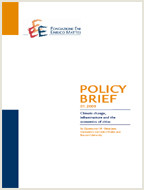New perspectives in the economics of culture and social interactions
Since Gary Becker’s seminal contributions on the economics of the family and crime, which made him win the Nobel Prize in economics in 1992, economists have become increasingly interested in explaining non-market activities and social behaviours of individuals. There are two main reasons why economists, using the theoretical and empirical tools developed in more standard fields (e.g. consumer theory, monetary policy, international trade, etc.), can add to the policy debate on culture and crime. First, the particular attention economists put in distinguishing correlations from causation links helps improving the understanding of events occurring in these fields. Second, the rigorous quantitative nature of economic analysis can play an important role in properly measuring effects of alternative policies and introducing new variables in the analysis. Recent developments in economic analysis applied to issues related to, among others, criminal behaviour, transmission of cultural traits and emergence of religious institutions have been discussed by prominent European and US scholars during the Conference “Economics of Culture, Institution and Crime” held at FEEM on 20-22/01/2010. This Policy Brief reviews the main findings presented at the Conference and elaborates policy recommendations for Europe and beyond.

